

 See preceding page for earlier posts today, 11/5/10.
See preceding page for earlier posts today, 11/5/10.

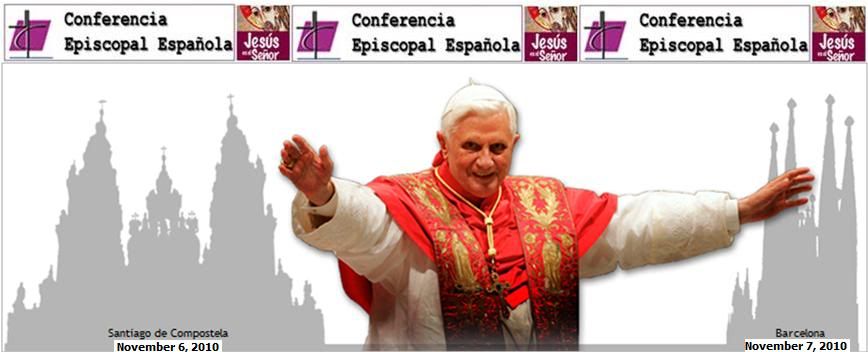 Pilgrims gather to see Pope
Pilgrims gather to see Pope
in Santiago and Barcelona
By Denholm Barnetson

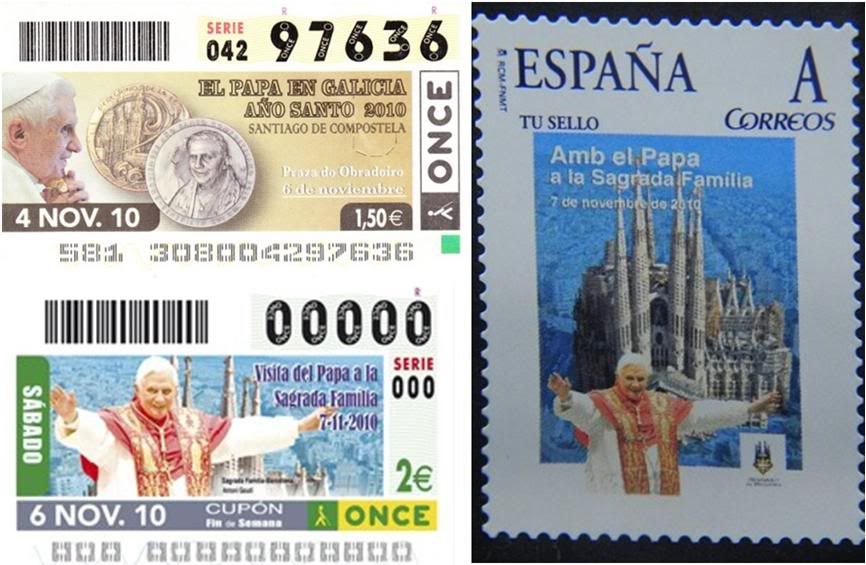 Left, Spain's national lottery ONCE designed its coupons for the Nov. 4 and Nov. 6 draws to serve as souvenirs of the Pope's visit; right, a stamp commemorates the Pope's dedication of Sagrada Familia.
Left, Spain's national lottery ONCE designed its coupons for the Nov. 4 and Nov. 6 draws to serve as souvenirs of the Pope's visit; right, a stamp commemorates the Pope's dedication of Sagrada Familia.
SANTIAGO DE COMPOSTELA, Nov. 5 (AFP) — Pilgrims descended Friday on Spain's holiest city, Santiago de Compostela, to get a glimpse of Pope Benedict XVI, on a mission to reclaim Europe for the Church.
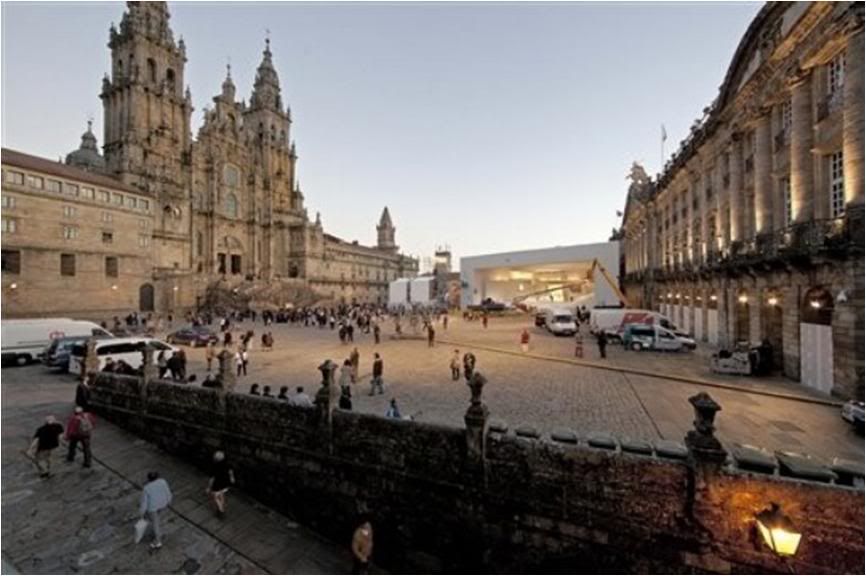
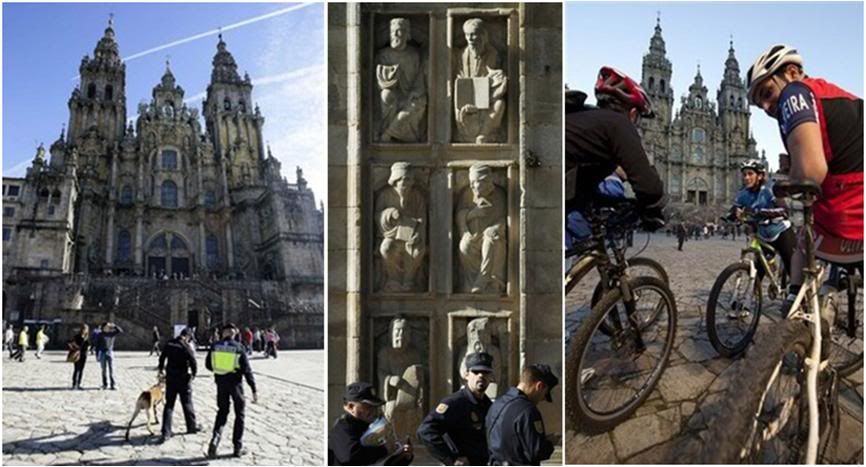
On the eve of the Pope's arrival here for a weekend visit that will also take in Barcelona, planes were packed and the state-owned rail network Renfe added 13,000 extra seats to trains headed to the city.
The Pontiff lands Saturday to pray at the tomb of Saint James the Greater, whose remains were discovered by a hermit in 813 and became a rallying cry for Christian Spain, pinned by the Moors to the northern strip of the peninsula.
The Roman Catholic Church appears again to be under attack on many fronts, and Benedict XVI is seeking a new rallying cry.
The Church was an all-powerful presence in the lives of Spaniards during the dictatorship of General Francisco Franco. But with the arrival of democracy, Spain tore down many of the regime-imposed restrictions on dress-code, behavior and sexual mores.
Under the Socialist Party of Prime Minister Jose Luis Rodriguez Zapatero, the country has gone dramatically further, allowing gay marriage – in five years, 20,000 gay couples have tied the knot – speedier divorce and easier abortions.
Of particular concern to the Church, women can have abortion on demand up to 14 weeks of pregnancy, in case of risk to the life and health of the mother until 22 weeks. Girls of 16 and 17 can get an abortion without their parents' consent if they face a risk of family violence, threats or pressure.
Benedict XVI will warn against "the idea inherited from the French Revolution that in order to be fully human you have to get rid of religious tradition," Celso Morga, undersecretary for the Congregation of the Clergy, said in the Vatican ahead of the visit.
But in eight years the proportion of Spaniards who describe themselves as Roman Catholic has dropped to 73 percent from 80 percent and those attending weekly Mass to 13 percent from 20 percent.
In Santiago, after praying in the sprawling, majestic cathedral, the Pope will embrace the statue of Saint James – a tradition kept by masses of pilgrims who have visited every year since the Middle Ages.
Benedict XVI will then celebrate Mass in the vast Plaza Obradoiro outside the cathedral's main facade in the heart of the medieval city – a UNESCO World Heritage site since 1985 – in front of some 7,000 people.
Shops leading to the cathedral – whose two towers rise to a height of about 75 meters (250 feet) – were already crammed with souvenirs of the Pope's visit. Shopkeepers said commemorative bracelets and stickers, ceramic thimbles and key chains bearing the Pope's image were the most sought-after items.
Yellow-and-white Vatican flags flew from buildings leading into the Plaza Obradoiro, where a massive soundstage was decked out in white behind rows of purple flowers.
"Welcome Holy Father," said one banner.
Portuguese couple Nuno Rocha and Luisa Costa, both 31 and veterinarians, walked 185 kilometers (115 miles) from Barcelos in Portugal. "We timed our visit to coincide with the Pope," said Luisa.
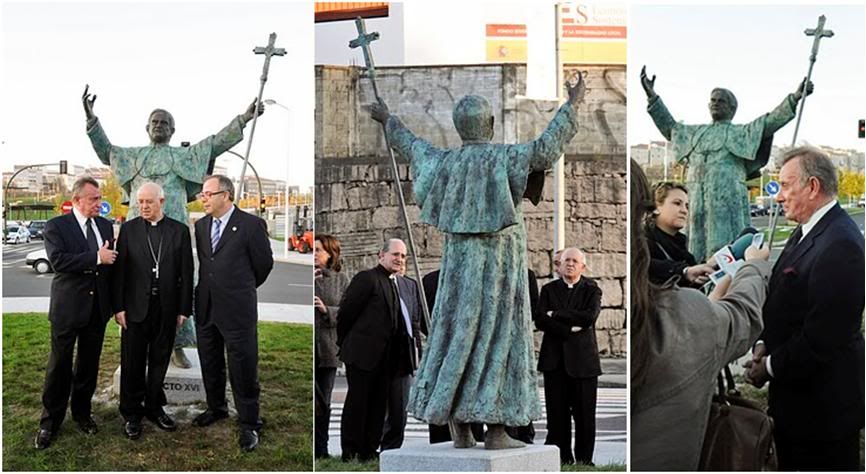
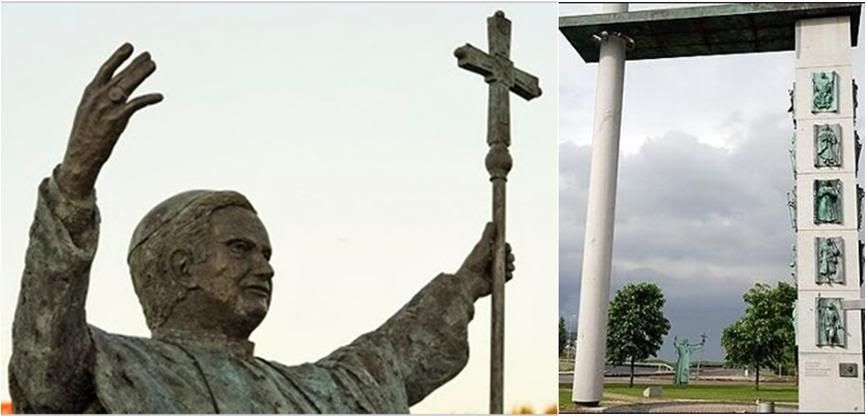 The Pope's statue is placed strategically at the gate to the city along the main route of the Camino de Santiago. Joining the mayor at the unveiling of the state are Mons. Julian Barrio, Archbishop of Santiago, and the sculptor Candido Pazos (in right photo).
The Pope's statue is placed strategically at the gate to the city along the main route of the Camino de Santiago. Joining the mayor at the unveiling of the state are Mons. Julian Barrio, Archbishop of Santiago, and the sculptor Candido Pazos (in right photo).
And Santiago mayor Xose Sanchez Bugallo on Thursday inaugurated a one ton, 98,000-euro (140,000-dollar) bronze statue of Pope Benedict XVI to commemorate his visit which depicts the pontiff with his arms outstretched and carrying a walking stick.
But many in Spain are set against the Pope's message.
When the Pope consecrates the great unfinished masterpiece of Antoni Gaudi, the Sagrada Familia church, in Barcelona on Sunday, hundreds of gays plan to stage a mass kiss-in.
"We are hoping for a crowd of people of the same sex who will kiss each other for two minutes in front of the Pope," said one of the organizers, Marylene Carole.
[As if the Pope would stay put for two minutes to accommodate them!]
Protesters against the visit massed Thursday night both in Santiago de Compostela and Barcelona.
In Barcelona, banners held by 2,000 demonstrators declared "Jo no t'espero" ("I'm not waiting for you" in Catalan) carried by a crowd of more than 2,000 people in the Sant-Jaume Square.
"Children welcome, priests go away!," said another placard carried by a child, referring to the child sexual abuse scandals that have rocked the Roman Catholic Church worldwide but largely spared Spain.
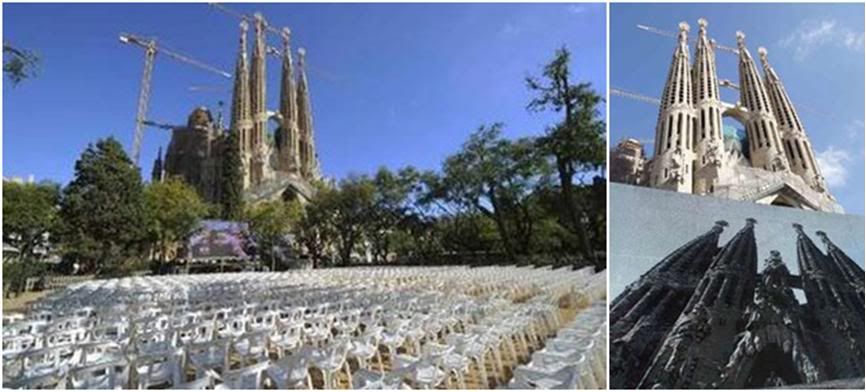 In Barcelona, some 40,000 seats have been placed around Sagrada Familia to accommodate parish delegations from all over Spain to follow the rites on giant TV screens (right).
In Barcelona, some 40,000 seats have been placed around Sagrada Familia to accommodate parish delegations from all over Spain to follow the rites on giant TV screens (right).
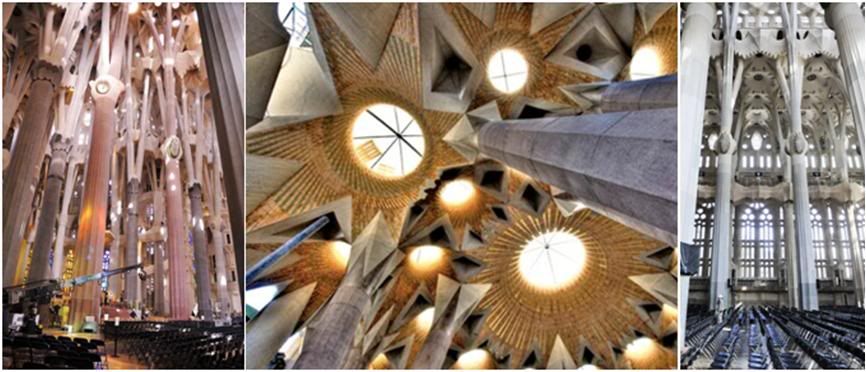 First views of the interior of Sagrada Familia gives an idea of the wealth of original architectural features conceived by Gaudi.
First views of the interior of Sagrada Familia gives an idea of the wealth of original architectural features conceived by Gaudi.
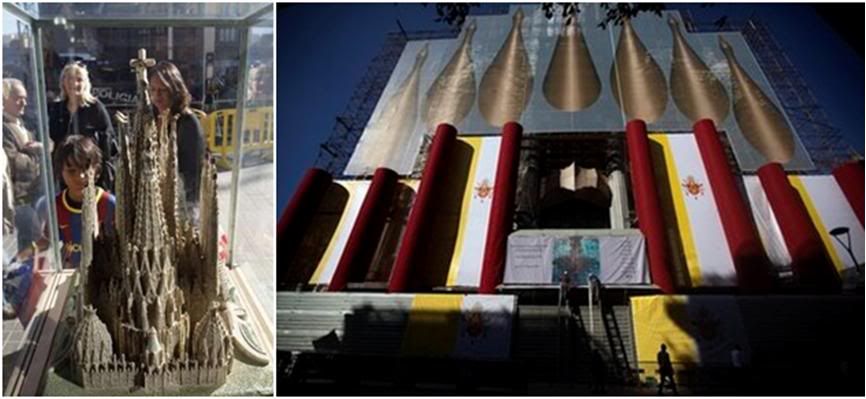 Left, tourists look at a scale model of Sagrada Familia as it will look when completed; right, an unfinished facade is draped for the rites.
Here's an eloquent reflection from Jose Luis Restan
Left, tourists look at a scale model of Sagrada Familia as it will look when completed; right, an unfinished facade is draped for the rites.
Here's an eloquent reflection from Jose Luis Restan:
The Pope's trip
as a gift for Spain
 Translated from
Translated from

04/11/2010
That the Pope comes to our land is no small matter. Not just because of our healthy expectation and sincere affection, or because it is a fervent answer to the rubbish coming from some politicians and media .
Benedict XVI comes at a crossroads in our history as a nation, at a moment of cultural and social fracture, of growing disenchantment and nihilism.
He comes to confirm in faith in a Church which, as he himself said recently of Portugal, has to learn anew how to exist in a society which has suffered profound anthropological and cultural mutation.
As the Successor of Peter, he will arrive in eternal Compostela to enter as one more pilgrim through the Holy Door and prostrate himself at the feet of the Apostle James.
The gesture itself condenses an immense and central significance: We do not invent Christianity. We receive it. Int he apostolic succession, there is an unbroken chain of witnesses who make real today, at this dawn of the 21st century, that first encounter of the disciples with Jesus.
The fisherman from Galilee who came as far as Finisterrae
[old term for the Iberian peninsula] - the ends of the earth - moved by the desire to announce the Gospel, greets the Pope theologian from Bavaria. Who would have imagined such a story?
And so this time, the Pope enters Spain through Santiago, demonstrating by gestures and words the rock of apostolic faith, a substancenot rooted in power, influence or even the institutional prestige which the Church has managed to gain in every era, but in the fidelity to Christ that has been sealed by the lives of so many generations of Christians.
The Way itself that Benedict XVI will have symbolically travelled, fulfilling an old personal desire, is an icon of this beautiful Christian history that is also tragic, of the faith that shaped communities, works, arta and culture, and realized in charity. The faith which has also sealed thousands of martyrs in their blood, something which continues in many parts of the world today.
A Pope who has thought and spoken about Europe so much cannot fail to contemplate the expanse off the old Continent from this storied pilgrim goal of Compostela.
No longer is there that Iron Curtain still present in 1982 when John Paul II called from here for a Europe that was united from the Atlantic to the Urals, a Europe which the Slavic Pope dreamed would once again be revitalized by the sap of Christian faith. The Curtain has fallen but the marginalization of God seems like a chill wind blowing across the Continent from east to west and back.
The Church for its part must get on with its own purification, as Benedict XVI often underscores. She has undergone quite a pruning but she has also deepened her awareness of her mission in this new context of near Godlessness, and now nurses the sprouts of an emerging spring.
And Benedict XVI, the theologian Pope who recently paid tribute to Guardini and Peterson, is the man Providence has given us to guide the Church in this phase of her earthly pilgrimage. Anchored and raised in the best Catholic tradition, he has asusmed the challenge of a new mission, of a new dialog no less provocative than that which the Fathers of the Church had to carry on in the first centuries of the Christian era.
He has needed "to show the world new worlds" at a time that demands of Christians prophetic daring, courage and creativity, intelligence and passion.
That is why I believe that the Pope's teaching will not just be a nostalgic evocation of the Christian roots of Europe, bur rather an urgent call to embody in this century's historical mold the irreducible originality of the Christian faith. It is an invitation to take the risk of personal and communitarian witness to Christ.
That is why the visit to Barcelona is also a challenge - that some elements who are clumsily enraged have perceived well. Yet in the midst of this highly secularized city there arise the beautiful needle spires of Sagrada Familia, protecting a space for life, a space for Christian liturgy which celebrates the irruption of Mystery into the daily terrain of mortal men.
To dedicate this temple is also to affirm to one and all that the faith lives and throbs in the fabric of this city, like a lighted hearth that is open to everyone.
It is to show that the faith embodied in the daily biography of millions of men and women has not become prey to the cultural forms of an era nor reined in by the errors of history.
This faith is an impetuous current that sometimes seems to flow underground but which always seeks the light of day, like that torrent of stone that elevates itself towards the sky of Barcelona, sculptured by the fantastic genius of an exemplary Christian, Antonio Gaudi.
Perhaps this basilica dominating an urban jungle, witness to solitude and abandonment, but also of the tireless seeking inherent in the inhabitants of a secularized city, is a reflection of that Court of the Gentiles that Benedict XVI has suggested and underscored on his trip to Prague [said to be Europe's most secularized city].
Perhaps the words - beautiful and precise - of this man, father and brother, will soothe many pains, open up obstinate minds, and launch us into the adventure of mission.
And perhaps not a few, now alienated from the heart of the Church but uneasy in their human seeking, will realize they are our friends, we who have by grace encountered and kept the gift of faith, who wich to share our hope with open hearts.
This will be two gifts in one: a Church that is more free and more daring in reaching a new Finisterrae as St. James did, and a society that is more reconciled among its various affluents, more united in the search for justice and peace.
AP has a comprehensive and objective pre-visit article:
Pope heads to a less Catholic Spain;
protest demos precede the visit
By Daniel Woolls

MADRID, Nov. 5 (AP) —Pope Benedict XVI meets Spain's Facebook generation this weekend -- setting up a clash of values and lifestyles in a once-staunchly Catholic nation that has become one of Europe's most liberal.
The visit is part of a major Vatican push to make increasingly secular Europe re-embrace its Christian roots, but the Pope faces a big challenge in a nation that has undergone an extraordinary social transformation in just the past few years -- with laws allowing gay marriage, fast-track divorce and easier abortions.
These changes are the latest, perhaps most dramatic, chapter in Spain's reinvention after the deeply conservative dictatorship of Gen. Francisco Franco, who died in 1975.
After rigid social and political constraints came an explosion of hedonism and cultural vigor that caused the nation to stray further and further from its religious heritage.
It has all horrified the Vatican, which remembers a not-so-distant age when all public schoolrooms had a picture of Franco and a crucifix mounted on the wall. For many liberal Spaniards, on the other hand, it's the Church's association with the Franco regime that has been a cause for much of the alienation.
"This is without a doubt the least Catholic Spain in history, and demographic data suggest it will continue to become less and less Catholic," sociologist Kerman Calvo said of the country hosting Pope Benedict Saturday for a two-day visit.
Indeed, church attendance is falling steadily and at Mass on Sunday most worshippers have gray hair. Congregations are fast losing young people. And civil ceremonies now outnumber church marriages for the first time.
Against that challenging backdrop, the Pope's tour starts in Santiago de Compostela, a medieval and present-day pilgrimage site whose ornate cathedral is said to hold the remains of St. James the Apostle.
It ends Sunday in Barcelona, where the Pope will consecrate part [
Not just part, but the church itself] of the Sagrada Familia, or Holy Family, church -- Antoni Gaudi's unfinished architectural marvel.
Tensions rose even before the Pope arrived, as riot police swinging truncheons clashed Thursday night with anti-papal protesters in Santiago, some of whom carried red banners reading "I am not waiting for you."
In Barcelona,
hundreds of people staged a peaceful nighttime rally against the visit, with
banners decrying everything from the cost of hosting the Pope to the pedophile priest scandal that has rocked the Vatican.
Thousands of gays and lesbians plan a kiss-in in Barcelona in the Pope's presence as he leaves the grounds of the city's Gothic 14th-century cathedral on Sunday morning, puckering up en masse to protest against the conservative Pontiff, whose opposition to gay marriage is well known.
[It is the opposition of the Church, not justa personal position of the pope!]
Barcelona radio station RAC1 reported Friday that a man walking his dog came across documents this week that included names of hotels where papal delegation members would stay, details on security cameras for the visit and the names, emails and telephone numbers of high-ranking Spanish security authorities.
Spanish authorities downplayed the possibility of a security breach, saying the documents had been reported lost a month ago and that logistical plans to deal with the papal visit had been adjusted.
The pope already visited Spain in 2006 for a rally stressing family values, and plans to come again next summer for a Vatican event called World Youth Day.
The trio of journeys by a man who is 83, albeit robust, show that Spain is very much a part of the Vatican's drive to rekindle Christianity as Europeans turn away from religion as a source of meaning in their lives.
Monsignor Celso Morga, a Spaniard and undersecretary in the Vatican's office for clergy, said the Pope "wants to give a message to Europe, young and old: Let's return to the tomb of the apostle, let's return to the origins of our faith which built Europe."
Faith, the family, and Christian life in Europe are likely to be themes the Pope will touch on during the trip, said the Vatican spokesman, the Rev. Federico Lombardi.
The Pope is visiting Santiago as a pilgrim to celebrate its jubilee year, which falls every time the July 25 feast of St. James -- Spain's patron saint -- comes on a Sunday. The Vatican says the symbol of St. James, a scallop shell, is particularly dear to the Pontiff and is part of his papal coat of arms.
As many as 200,000 people are expected to travel to Santiago de Compostela to see the Pontiff, packing the square outside the cathedral and cobblestone streets of its beautiful old quarter. The Vatican says the Pope's Mass Sunday in Barcelona could draw as many as 100,000 people.
Despite the expected crowds, the influence of the Catholic church in Spain has waned in the decades since Franco died in 1975.
However Javier Elzo, a professor emeritus at Deusto University in the Basque region and expert on the sociology of religion, said he is not ready to declare Catholicism comatose in Spain.
He noted that a poll released in September showed 73 percent of those questioned still consider themselves Catholic, calling that significant even if it is down nearly 10 points since 1994.
"The Catholic brand has not disappeared. Name me a political party, labor union, football team, singer or whatever that has the stated support of 73 percent of the population," Elzo said.
Part of the problem in Spain is that many Catholics want to remain true to their faith but are frustrated with the conservative bent of the Pope and of Spanish bishops named in the times of the late John Paul II, said Mariano Benito, a churchgoing businessman of 46.
"The Church needs to get up to date," Benito said, holding the hand of his small son on a sunny afternoon in Madrid, not far from their parish church. "The Church would have a lot to gain."
Since his election in 2004, Socialist Prime Minister Jose Luis Rodriguez Zapatero has angered the church with his liberal-minded reform program.
The latest plank was officially installed in July with a law that eased abortion legislation dating back to 1985, providing for unrestricted abortion in the first 14 weeks of a pregnancy and letting girls as young as 16 undergo the procedure with no need for parental consent. It's a far cry from the Franco era in which Spanish women traveled to England, France or Holland for abortions.
But now Zapatero is overseeing an economy struggling to overcome recession and a nearly 20 percent jobless rate and trailing the opposition conservatives badly in the polls with elections due in 18 months -- and
has apparently shelved plans to enact a law that would force the removal of crucifixes from schools and other public buildings such as hospitals.
The conservative Popular Party has challenged the abortion law in Spain's highest court, and party leader Mariano Rajoy has said that if elected prime minister he would propose erasing the clause allowing 16- and 17-year-olds to abort without parental permission.
Father Olegario Gonzalez de Cardedal, a professor of theology at the University of Salamanca, says Spanish society has changed tremendously over the past 50 years and the Church is working to catch up and find new ways to spread faith now that old models like the family and small local parishes have lessened in importance. He acknowledges the role of the Church has weakened, but insists it remains strong and is trying to adjust.
These days, he wrote in the conservative newspaper ABC, "people get their education from the street, from music, from information society in its diverse and extremely complex channels, from the society of anonymity."
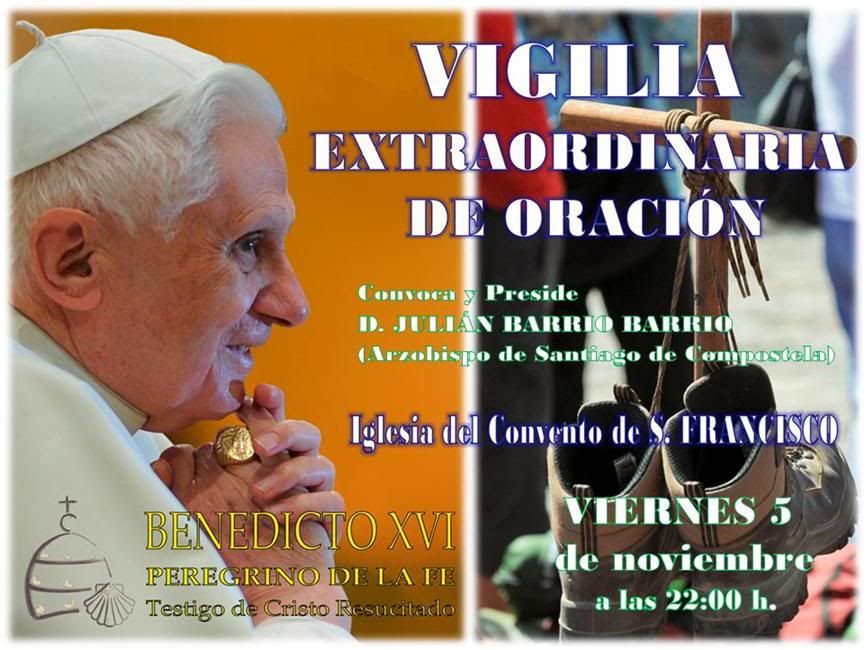 Poster for Compostela's prayer vigil Friday night before the Pope's visit.
Poster for Compostela's prayer vigil Friday night before the Pope's visit.
[Modificato da TERESA BENEDETTA 06/11/2010 12:34]